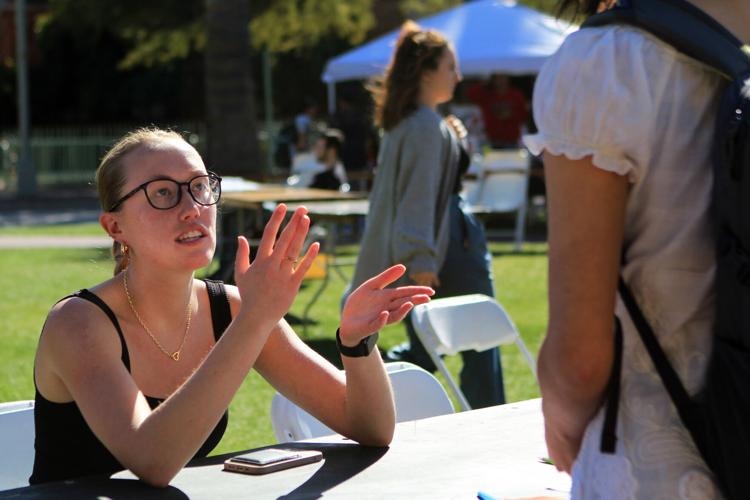Following in the footsteps of their parent nonprofit organization in Southern California, the University of Arizona’s chapter of Team Awareness Combating Overdoses — or TACO — is addressing the opioid epidemic through a preventative approach.
The UA’s chapter of TACO was founded in the fall of 2022 by Madison Trotter, a junior studying neuroscience and cognitive science. Trotter said she found out about the national organization through Instagram, where she learned more about their mission and was inspired to establish a chapter .
“The more I read into it, the more intrigued I was,” Trotter said. “I (thought,) ‘People need to know this.’”
In 2022, Pima County had 284 deaths due to opioid overdose events and another 594 non-fatal opioid overdoses, according to the Arizona Department of Health Services. About 13% of the non-fatal overdose events were of people between 18- and 24 years old, and 8% of the overdose deaths fell within the same age group. Fentanyl was involved in about 64% of the non-fatal overdose events in the state in 2022, an increase of 22% from 2021.
Before TACO’s parent nonprofit was founded at the University of Southern California in 2020, Trotter said that the students were reporting about 10 to 12 fentanyl-involved overdose deaths a year. However, since the founding of USC’s TACO, Trotter said the annual number decreased to zero.
TACO’s philosophy focuses on the prevention of opioid overdose deaths through data-based education, overdose-response training and drug testing. What drew Trotter into the program was its unique message in prioritizing harm reduction over crisis management. Instead of focusing on life-saving measures in the case of an emergency, TACO emphasizes the importance of education and the benefits of testing drugs before use.

“As I’ve come into this organization, I realized that saying no doesn’t work all of the time,” Trotter said.
During its short time on the UA campus, TACO has distributed over 300 free fentanyl testing kits, allowing students to confirm if the drugs they use contain fentanyl. These kits have QR codes that, when scanned, show instructions on how to test the drugs depending on what type of substance it is.
On Friday, Feb. 17, TACO will be hosting a pop-up event in the early afternoon near the student apartment complexes on North Tyndall Avenue and East First Street, where they will be passing out testing kits for free to those in the area.
TACO also advocates for improved education surrounding drug use, promoting neutral statistics and data that consider the reality of drug use among young adults in a non-judgmental way. Rather than feeding into the stigma surrounding the recreational use of drugs, TACO aims to allow people to make their own informed decisions about using substances.
Savannah Crowley, a public health major at UA and the vice president of TACO, noted the importance of using language that doesn’t contribute to the stigmatization surrounding drug use in order to make people feel more comfortable in asking for help.
“One thing we focus on in public health is person-first language, things like ‘someone with addiction’ rather than an ‘addict,’” Crowley said. “It’s all about making sure people are treated fairly and feel comfortable reaching out for help, having important conversations and asking for information.”
TACO actively shares data about different substances through infographic posts on their Instagram page. These bright, colorful infographics shed light on common misconceptions about different drugs and share important facts in an easily digestible format through social media.
“One thing that I love about TACO is that it’s just neutral data. It’s not an anti or pro stance,” Trotter said. “It’s more of, ‘Here’s the information, it’s up to you to choose what you want to do with it.’”
The organization has also made strides in collaborating with other student groups on campus, including the Women in Medicine and Science club and the Psychedelic Medicine Radar newsletter. On Jan. 25, TACO gave a presentation about their mission to members of WIMS during a weekly meeting, where they explained statistics about fentanyl and the impact of the opioid epidemic on the college-aged population.
Taylor Veschio is the president of the WIMS and a member of TACO, and said that for members, and especially future health providers, it’s crucial to be aware of this information and to be able to hear it in a safe environment.
TACO seeks to focus their efforts this semester toward the Greek Life community, a student population they believe would benefit the most from their education efforts. Nick Ward, TACO’s head of outreach at UA, highlighted the importance of allowing for conversations about drug use and how to improve safety among fraternities and sororities.
“Shifting the stigma just really allows people to have those open conversations,” Ward said. “It’s definitely something that I’ve noticed, and what I’m trying to hammer on more now is there’s this massive gap in conversations between fraternities and sororities.”
What's Working
Arizona program hopes to be nationwide model for healthy babies
However, a hurdle TACO has faced has been in fundraising, an aspect of their organization they hope to improve in order to continue providing access to free testing strips for students and give back to the nonprofit parent chapter.
Ward said that TACO has plans to team up with Duffl, a company that employs college students to deliver snacks to other students on campus, and wants to collaborate with the company to carry fentanyl test strips. Ward said that a similar initiative was adopted at USC, and that the test strips ended up one of the most popular items carried by Duffl.
However, in order to have Duffl carry the test strips for free at UA, TACO needs money to supply enough strips for distribution.
“We are looking to do more fundraising, but the pushback is on the financial end,” Ward said. “We have a limited stock on hand, and a lot of that comes from the national organization.”
TACO members are hopeful that future fundraising and outreach efforts will help in financing more test strips for distribution on campus, as well as allow the UA chapter to give back to the national nonprofit. The group hopes to take part in the UA’s Safe Spring Break Symposium this semester, an annual program directed at students dedicated to promoting smart decision-making during the university’s Spring Break.
With a slew of plans in the works for the semester, Trotter is eager to continue spreading TACO’s message and make an impact on combating the opioid epidemic.
“At the end of the day, the message that I love is that everybody deserves a chance to wake up in the morning, no matter what decisions they make and the opportunities they take,” she said. “Everyone deserves that chance to be safe and educated about something they do.”
Get your morning recap of today's local news and read the full stories here: tucne.ws/morning






